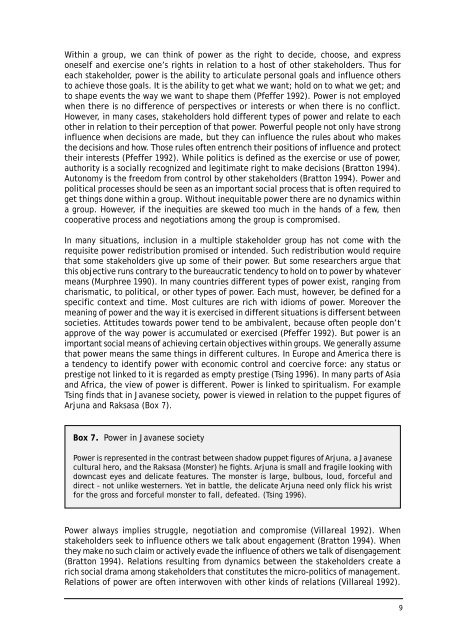Where the power lies: multiple stakeholder politics over natural ...
Where the power lies: multiple stakeholder politics over natural ...
Where the power lies: multiple stakeholder politics over natural ...
Create successful ePaper yourself
Turn your PDF publications into a flip-book with our unique Google optimized e-Paper software.
Within a group, we can think of <strong>power</strong> as <strong>the</strong> right to decide, choose, and express<br />
oneself and exercise one’s rights in relation to a host of o<strong>the</strong>r <strong>stakeholder</strong>s. Thus for<br />
each <strong>stakeholder</strong>, <strong>power</strong> is <strong>the</strong> ability to articulate personal goals and influence o<strong>the</strong>rs<br />
to achieve those goals. It is <strong>the</strong> ability to get what we want; hold on to what we get; and<br />
to shape events <strong>the</strong> way we want to shape <strong>the</strong>m (Pfeffer 1992). Power is not employed<br />
when <strong>the</strong>re is no difference of perspectives or interests or when <strong>the</strong>re is no conflict.<br />
However, in many cases, <strong>stakeholder</strong>s hold different types of <strong>power</strong> and relate to each<br />
o<strong>the</strong>r in relation to <strong>the</strong>ir perception of that <strong>power</strong>. Powerful people not only have strong<br />
influence when decisions are made, but <strong>the</strong>y can influence <strong>the</strong> rules about who makes<br />
<strong>the</strong> decisions and how. Those rules often entrench <strong>the</strong>ir positions of influence and protect<br />
<strong>the</strong>ir interests (Pfeffer 1992). While <strong>politics</strong> is defined as <strong>the</strong> exercise or use of <strong>power</strong>,<br />
authority is a socially recognized and legitimate right to make decisions (Bratton 1994).<br />
Autonomy is <strong>the</strong> freedom from control by o<strong>the</strong>r <strong>stakeholder</strong>s (Bratton 1994). Power and<br />
political processes should be seen as an important social process that is often required to<br />
get things done within a group. Without inequitable <strong>power</strong> <strong>the</strong>re are no dynamics within<br />
a group. However, if <strong>the</strong> inequities are skewed too much in <strong>the</strong> hands of a few, <strong>the</strong>n<br />
cooperative process and negotiations among <strong>the</strong> group is compromised.<br />
In many situations, inclusion in a <strong>multiple</strong> <strong>stakeholder</strong> group has not come with <strong>the</strong><br />
requisite <strong>power</strong> redistribution promised or intended. Such redistribution would require<br />
that some <strong>stakeholder</strong>s give up some of <strong>the</strong>ir <strong>power</strong>. But some researchers argue that<br />
this objective runs contrary to <strong>the</strong> bureaucratic tendency to hold on to <strong>power</strong> by whatever<br />
means (Murphree 1990). In many countries different types of <strong>power</strong> exist, ranging from<br />
charismatic, to political, or o<strong>the</strong>r types of <strong>power</strong>. Each must, however, be defined for a<br />
specific context and time. Most cultures are rich with idioms of <strong>power</strong>. More<strong>over</strong> <strong>the</strong><br />
meaning of <strong>power</strong> and <strong>the</strong> way it is exercised in different situations is differsent between<br />
societies. Attitudes towards <strong>power</strong> tend to be ambivalent, because often people don’t<br />
approve of <strong>the</strong> way <strong>power</strong> is accumulated or exercised (Pfeffer 1992). But <strong>power</strong> is an<br />
important social means of achieving certain objectives within groups. We generally assume<br />
that <strong>power</strong> means <strong>the</strong> same things in different cultures. In Europe and America <strong>the</strong>re is<br />
a tendency to identify <strong>power</strong> with economic control and coercive force: any status or<br />
prestige not linked to it is regarded as empty prestige (Tsing 1996). In many parts of Asia<br />
and Africa, <strong>the</strong> view of <strong>power</strong> is different. Power is linked to spiritualism. For example<br />
Tsing finds that in Javanese society, <strong>power</strong> is viewed in relation to <strong>the</strong> puppet figures of<br />
Arjuna and Raksasa (Box 7).<br />
Box 7. Power in Javanese society<br />
Power is represented in <strong>the</strong> contrast between shadow puppet figures of Arjuna, a Javanese<br />
cultural hero, and <strong>the</strong> Raksasa (Monster) he fights. Arjuna is small and fragile looking with<br />
downcast eyes and delicate features. The monster is large, bulbous, loud, forceful and<br />
direct – not unlike westerners. Yet in battle, <strong>the</strong> delicate Arjuna need only flick his wrist<br />
for <strong>the</strong> gross and forceful monster to fall, defeated. (Tsing 1996).<br />
Power always imp<strong>lies</strong> struggle, negotiation and compromise (Villareal 1992). When<br />
<strong>stakeholder</strong>s seek to influence o<strong>the</strong>rs we talk about engagement (Bratton 1994). When<br />
<strong>the</strong>y make no such claim or actively evade <strong>the</strong> influence of o<strong>the</strong>rs we talk of disengagement<br />
(Bratton 1994). Relations resulting from dynamics between <strong>the</strong> <strong>stakeholder</strong>s create a<br />
rich social drama among <strong>stakeholder</strong>s that constitutes <strong>the</strong> micro-<strong>politics</strong> of management.<br />
Relations of <strong>power</strong> are often interwoven with o<strong>the</strong>r kinds of relations (Villareal 1992).<br />
9

















